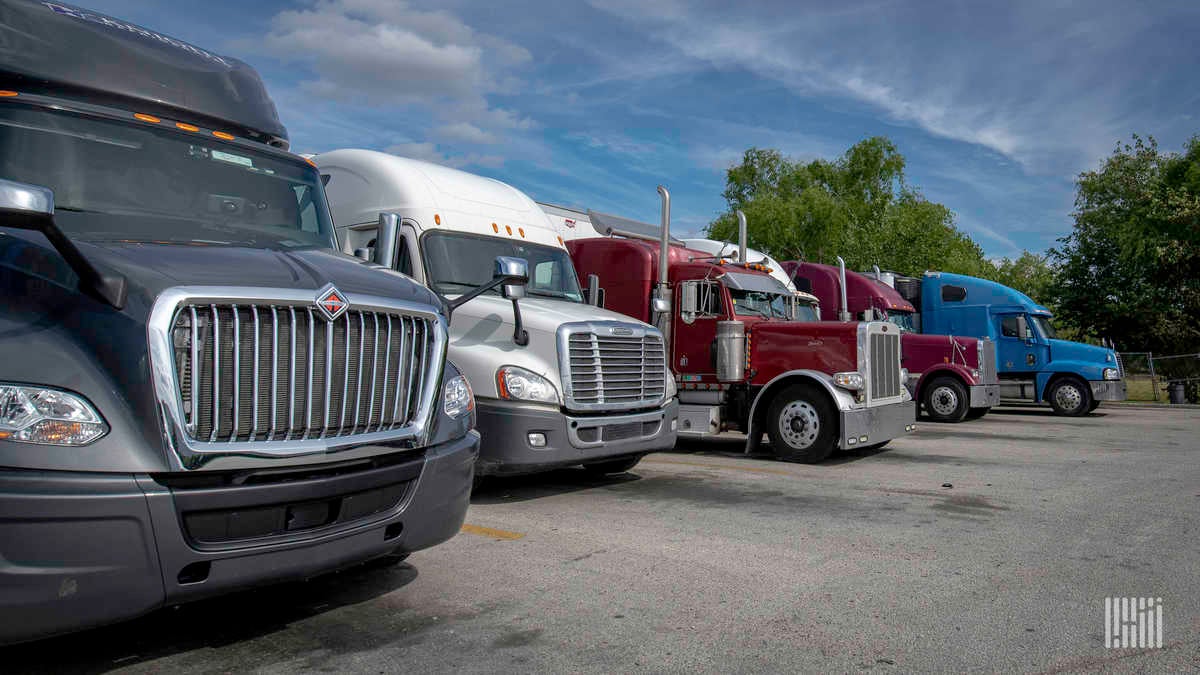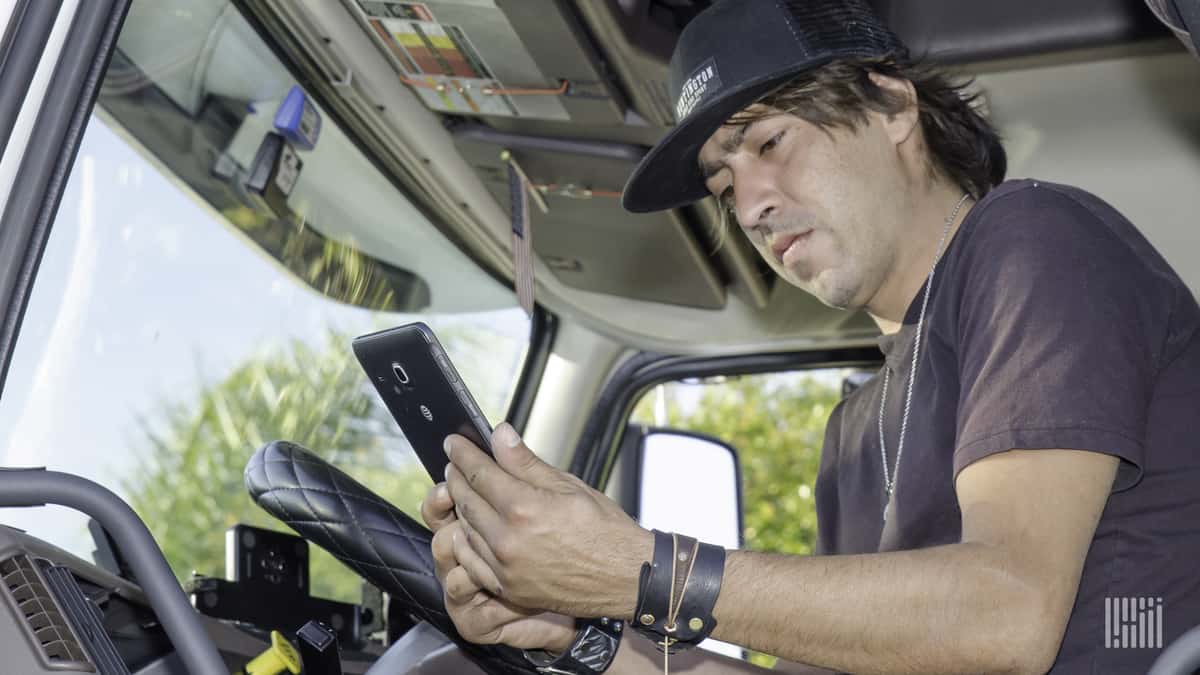The views expressed here are solely those of the author and do not necessarily represent the views of FreightWaves or its affiliates.
Author’s Disclosure: I am not an investor in FleetOps, either personally or through REFASHIOND Ventures. I have no financial relationship with FleetOps.
FleetOps, the Toronto-based, data-driven freight trucking marketplace, has raised a seed funding round of $6 million to further deploy its industry-changing technology and proprietary dataset to brokerages around the globe. FleetOps sits at the center of the logistics data equation by offering greater opportunities and flexibility to three sides of the marketplace – truck drivers, brokers and telematics providers.
Chris Atkinson, Founder and CEO of FleetOps, told me that the round was co-led by New York-based Inspired Capital and San Francisco-based Resolute Ventures, along with Hike Ventures, Basecamp Fund, Newark Venture Partners, BCF Ventures, Panache Ventures and Brian Thomas. In addition, FleetOps is announcing new partnerships with Loadsmart, P44 and Shipwell.
FleetOps raised a total of CA$1.9 million in equity between April 2015 and September 2018.
This installment of the AI in Supply Chain series (#AIinSupplyChain) discusses what FleetOps has done since it was founded in 2017, as well as its plans for the near future.

(Photo: Jim Allen/FreightWaves)
Defining the problem that FleetOps solves for truckers, brokers and telematics providers
The team at FleetOps believes that the fundamental problems in supply chain logistics are problems related to data, the quality of that data, and the resulting impact on how counterparties in supply chain logistics make decisions.
In my past conversations with Atkinson, and Amit Ahluwalia, Co-founder and COO of FleetOps, they have asserted that fragmentation within the trucking market makes access to critical data for decision-making an entrenched and severe problem for counterparties on all sides of the freight logistics markets. As a result carriers and shippers resort to making imperfect decisions because of the lack of reliable data. This leads to inefficient pricing because, in the absence of data, counterparties in the freight markets make their decisions largely by relying on personal relationships and gut instinct. In turn, this leads to further market inefficiencies and decreases trust between counterparties in the spot markets.

(Photo: Jim Allen/FreightWaves)
According to FleetOps, this has led to a situation in which trucks are empty at least 20% of the time, creating about $250 billion of lost productivity annually.
The ELD regulation in 2016 means that all commercial trucks are now connected to the internet. Electronic logging devices (ELDs) automatically record telematics data from truck engines. That data used to be trapped in disparate paper documents, email and spreadsheets. Thanks to the ELD regulation all that data is now more readily accessible to decision-making and analytics software platforms. FleetOps collects ELD data directly from the trucks in its marketplace and feeds that data to its matching algorithms.
For truckers: FleetOps automatically recommends loads based on the data that is fed through its platform from a truck’s engine as well as the truck driver’s smartphone, and other data provided by a fleet manager, dispatcher or owner-operator. They minimize empty miles, and truck drivers do not have to download another smartphone app on which they hunt for loads. In this sense, FleetOps theoretically eliminates the multi-homing problem that I have described in prior commentaries discussing digital freight brokers and their efforts to challenge traditional freight brokers.

(Photo: Jim Allen/FreightWaves)
FleetOps sees itself as an ideal partner for Convoy, Transfix, Uber Freight and other digital freight brokerage platforms because it increases the accuracy and efficiency of their load matching recommendations.
The company says that the 40,000 drivers who regularly access its marketplace currently accept about 33% of all the loads that its matching system recommends. In my previous conversations with Atkinson he said FleetOps has access to as many as 350,000 truck drivers through its partnerships with telematics providers.
For enterprise-scale truck brokers: FleetOps makes it easier to operate in the spot market by creating greater transparency so that brokers can assign more loads automatically to independent owner-operators and small trucking companies with greater confidence as reputations in the marketplace become established and understood by counterparties on all three sides of the company’s transaction platform.
FleetOps stated the brokers on its platform experience a 4.5x increase in the speed with which they can book new loads. The average broker using its marketplace can post, source, secure and manage freight at a rate that is 275% faster than the status quo. They say this leads to a larger number of transactions, and greater revenue for the brokers. The company also says that 80% of the loads entered into its systems are matched with a driver, and that brokers reduce their costs of onboarding a new driver by $350.

(Photo: Jim Allen/FreightWaves)
Given the 33% acceptance rate and the 80% match rate, a back-of-the-envelope calculation suggests that roughly 25% of the shipments available on FleetOps marketplace are moved entirely through the automatic recommendations made by the platform’s machine learning algorithms.
One of the company’s goals is to significantly increase that ratio.
The company says it has already seen monthly transactions increase by more than 100% this year as truckers and brokers adjust to COVID-19 amidst a strengthening freight market driven by demand patterns that reflect more ecommerce transactions at the expense of in-store shopping, across all retail categories. That aligns with the observations in Commentary: Can supply chain tech startups survive COVID-19? (FreightWaves, April 9) and Commentary: How supply chain startups are surviving COVID-19 (FreightWaves, April 23).
For ELD providers: A white-labeled version of FleetOps’ platform is useful because it provides them with a new product that they can bundle with the ELDs they sell to trucking fleets around the world. Moreover, it allows ELD providers to position ELDs as a potential means for trucking fleets to increase their revenues, whereas to-date, ELDs have been viewed only as an additional cost that carriers must bear.
FleetOps currently partners with FleetComplete, Geotab and BigRoad Freight. For ELD providers in the U.S. the partnership creates a new opportunity for growth in a market that has reached 100% saturation because of the ELD mandate.

(Photo: Jim Allen/FreightWaves)
Why FleetOps believes solving data fragmentation is critical
The team at FleetOps believes that solving the data fragmentation problem works to their advantage since it ensures that their machine learning processes, methods and algorithms will become increasingly more accurate over time as they gain access to data and information about trucks and drivers on one hand, and freight loads and shippers on the other. The team believes that this approach will enable FleetOps to build the world’s largest network of truckers and shippers, enabling FleetOps to keep driving efficiencies through the system.
I asked Atkinson what the team at FleetOps will be trying to accomplish in the next 18 to 24 months.
“We measure our success in how effectively we aggregate data on both sides of the market. Within 18 months we will see more than 3x the driver access we have today, and will be putting together some of the most important data-driven solutions with some of the largest brokerages in the industry,” he said.
To continue driving FleetOps’ rapid growth, the company has hired Bert Goo as Vice President of Sales and Partnerships. Goo brings 20 years of experience in freight matching within the U.S. transportation market. Most notably, he spent 18 years at DAT Solutions, where he was responsible for channel sales and partnerships.
I asked him why he decided to join FleetOps.
He said, “When I met the team it was very apparent how talented and passionate they were and that their vision was so aligned with mine when it came to optimizing the experience drivers and fleets had when securing freight in the spot market. There are a lot of companies that are trying to automate the negotiation and tendering process but FleetOps took a step back. They knew that if the right load was presented to the carrier the rest of the onboarding and management process was simplified and made more efficient. Through the use of advanced machine learning and AI algorithms they are making it happen.”
Harshal Jethwa is FleetOps’ Director of Engineering and co-founder. I asked him; “What AI techniques does FleetOps use? Reinforcement learning? Deep Learning?”
“We have deployed a state of the art machine learning system that combines ELD and app usage data to match carriers with the perfect load. Using both collaborative filtering and content-based models, we have created a hybrid recommender system that is able to find and utilize each carrier’s unique preferences and motivations. Drivers are seeing the true potential of this system as we make rapid progress by using patterns extracted from their trajectory data,” he said.
One of the initiatives FleetOps expects to pursue in the near future is the addition of automatic financing of accounts receivable for owner-operators on the FleetOps platform. Given the difficult economic characteristics of the trucking industry, this has the potential to become a popular feature.

(Photo: Shutterstock)
Conclusion
It seems obvious that the demand for decision-making technologies will remain robust as businesses adapt to more demanding customers, more intense competition, and a constantly shifting technology landscape. On one hand a pessimist would interpret the difficulties that AI is encountering as a sign of potentially fatal failures – see the July 28 instalment in this series. Alternatively, an optimist would interpret those same difficulties as an opportunity to ask different questions, and perhaps through that process to arrive at new solutions that work better than previous attempts.
FleetOps joins several other startups working on optimization of trucking, for large fleets, small fleets and owner-operators. It will be interesting to see how the different approaches to solving that problem fare against one another.
If you are a team working on innovations that you believe have the potential to significantly refashion global supply chains we’d love to tell your story in FreightWaves. I am focusing on AI in Supply Chain for the rest of 2020. I am easy to reach on LinkedIn and Twitter. Alternatively, you can reach out to any member of the editorial team at FreightWaves at media@freightwaves.com.
The reference archive – dig deeper into the #AIinSupplyChain Series with FreightWaves







